- Home
- Frank Herbert
The Lazarus Effect w-3 Page 8
The Lazarus Effect w-3 Read online
Page 8
"The Merman observers at Maritime didn't object to the court's decision," Brett said.
"You're right," Twisp said. He jerked a thumb upward toward the Maritime offices. "They're usually ruthless in cases like this. I wonder what we saw ... or almost saw."
Brett moved to one side and plopped himself onto the bubbly beside Twisp. They listened for a time to the thlup-thlup-thlup of waves against the Island's rim.
"I expected to be sent down under," Twisp said. "And you with me. That's what usually happens. You go to work for the dead Merman's family. And you don't always come back topside."
Brett grunted, then: "They'd have sent me, not you. Everybody knows about my eyes, how I can see when it's almost dark. The Mermen would want that."
"Don't give yourself airs, kid. Mermen are damned cautious about who they let into their gene pool. They call us Mutes, you know. And they don't mean something nice when they say it. We're mutants, kid, and when we go down under it's to fill a dead man's dive suit ... nothing else."
"Maybe they didn't want this job filled," Brett said.
Twisp tapped a fist on the resilient organics of the rail. "Or they didn't want anybody from topside to know what that Merman's job was."
"That's crazy!"
Twisp did not respond. They sat quietly for a while as the lone sun dipped lower. Glancing over his shoulder, Twisp stared at the horizon. It bent away in the distance to a bank of black sky and water. Water everywhere.
"I can get us outfitted," Brett said.
Twisp was startled but remained silent, looking at the kid. Brett, too, was staring off at the horizon. Twisp noticed that the boy's skin had become fisherman-dark, not the sickly pale he had displayed when he first boarded the coracle. The kid looked leaner, too ... and taller.
"Didn't you hear me?" Brett asked. "I said -"
"I heard you. For somebody who pissed and moaned most of the time he was out there fishing, you sound pretty anxious to get back on the water."
"I didn't moan about -"
"Just joking, kid." Twisp raised a hand to stop the objections. "Don't be so damned touchy."
His face flushed, Brett looked down at his boots.
Twisp asked, "How would you get this loan?"
"My parents would loan it to me and I'd loan it to you."
"Your parents have money?" Twisp studied the kid, aware that this revelation did not surprise him. In all the time they'd spent together, though, Brett had never talked about his parents and Twisp discreetly had never asked. Islander etiquette.
"They're close to Center," Brett said. "Next ring out from the lab and Committee."
Twisp whistled between his teeth. "What do your parents do that gets them quarters at Center?"
Brett's mouth turned up in a crooked grin. "Slurry. They made their fortune in shit."
Twisp laughed in sudden awareness. "Norton! Brett Norton! Your folks are the Nortons?"
"Norton," Brett corrected him. "They're a team and they bill themselves as one artist."
"Shitpainting," Twisp said. He chuckled.
"They were the first," Brett said. "And it's nutrient, not shit. It's processed slurry."
"So your folks dig shit," Twisp teased.
"Come on!" Brett objected. "I thought I got away from that when I left school. Grow up, Twisp!"
"All right, kid," he laughed, "I know what slurry is." He patted the bubbly beside him. "It's what we feed the Island."
"It's not that simple," Brett said. "I grew up with it, so I know. It's scraps from the fish processors, compost from the agraria, table scraps and ... just about everything." He grinned. "Including shit. My mother was the first chemist to figure out how to color the nutrient like they do now without hurting the bubbly."
"Forgive an old fisherman," Twisp said. "We live with a lot of dead organics, like the membrane on the hull of my coracle. Islandside, we just pick up a bag of nutrient, mix it with a little water and spread it on our walls when they get a little gray."
"Don't you ever try the colored stuff and make a few of your own murals on your walls?" Brett asked.
"I leave that to the artists like your folks," Twisp said. "I didn't grow up with it the way you did. When I was a kid, we only had a bit of graffiti, no pictures. It was all pretty bland: brown on gray. We were told they couldn't introduce other colors because that interfered with absorption by the decks and walls and things. And you know, if our organics die ..." He shrugged. "How'd your folks stumble onto this?"
"They didn't stumble! My mother was a chemist and my father had a flair for design. They went out with a wall-feeding crew one day and did a nutrient mural on the radar dome near the slurryside rim. That was before I was born."
"Two big historical events," Twisp joked. "The first shit painting and the birth of Brett Norton." He shook his head in mock seriousness. "Permanent work, too, because no painting lasts more than about a week."
Brett spoke defensively. "They keep records. Holos and such. Some of their friends have worked up musical scores for the gallery and theater shows."
"How come you left all that?" Twisp asked. "Big money, important friends ... ?"
"You never had some bigshot pat you on the head and say, 'Here's our new little painter.'"
"And you didn't want that?"
Brett turned his back on Twisp so fast that Twisp knew the kid was hiding something. "Haven't I worked out well enough for you?" Brett asked.
"You're a pretty good worker, kid. A little green, but that's part of the bargain on a new contract."
Brett didn't respond and Twisp saw that the kid was staring at the Maritime mural on the inner wall of the second level. It was a big and gaudy mural aglow in the hard light of the setting sun - everything washed a fine crimson.
"Is that one of their murals?" Twisp asked.
Brett nodded without turning.
Twisp took another look at the painting, thinking of how easy it was these days to walk past the decorated hallways, decks and bulkheads without even noticing the color. Some of the murals were sharply geometric, denying the rounded softness of Islander life. Famous murals, ones that kept Norton in constant, high priced demand, were the great historical pieces barely applied before they began their steady absorption toward the flat gray of hungry walls. The Maritime mural was something new in a Norton wall - an abstraction, a study in crimson and the fluidity of motion. It glowed with an internal power in the low light of the sun, seeming to boil and seethe along its rim like an angry creature or a thunderstorm of blood.
The sun lay almost below the horizon, throwing the sea's surface into the little dusk. A fine line of double light skittered across the top of the painting, then the sun dipped below the horizon and they were left with the peculiar afterglow of sunset on Pandora.
"Brett, why didn't your parents buy your contract?" Twisp asked. "With your eyesight, it seems to me you'd have made a fine painter."
The dim silhouette in front of Twisp turned, a fuzzed outline against the lighter background of the mural.
"I never offered my contract for sale," Brett said.
Twisp looked away from Brett, oddly moved by the kid's response. It was as though they suddenly had become much closer friends. The unspoken revelations carried a kind of cement, which sealed all of their shared experiences out on the water ... out there where each depended on the other for survival.
He doesn't want me to sell his contract, Twisp thought. He kicked himself for being so dense. It wasn't just the fishing. Brett could get plenty of fishing after his apprenticeship with Queets Twisp. The contract had increased in value simply because of that apprenticeship. Twisp sighed. No ... the kid did not want to be separated from a friend.
"I still have credit at the Ace of Cups," Twisp said. "Let's go get some coffee and ... whatever ..."
Twisp waited, hearing the little shufflings of Brett's feet in the growing dark. The Island's rimlights began their nightly duty - homing beacons for the time between suns. The lights started with a b
lue-green phosphorescence of wave tops, bright because the night was warm, then grew even brighter as the organics ignited. Out of the corners of his eyes, Twisp saw Brett wipe his cheeks quickly as the lights came up.
"Hell, we're not breaking up a good team, yet," Twisp said. "Let's go get that coffee." He had never before invited the kid to share an evening at the Ace of Cups, although it was well-known as a fisherman's hangout. He stood and saw an encouraging lift to Brett's chin.
"I'd like that," Brett said.
They walked quietly down the gangway and along the passages with their bright blue phosphorescence to light the way. They entered the coffeehouse through the wool-lined arch and Twisp allowed Brett a moment to look around before pointing out the really fancy feature for which the Ace of Cups was known throughout the Islands - the rimside wall. From deck to ceiling, it was solid wool, a softly curling karakul of iridescent white.
"How do they feed it?" Brett whispered.
"There's a little passageway behind it that they use for storage. They roll the nutrient on from that side."
There were only a few other early drinkers and diners and these paid little attention to the newcomers. Brett ducked his head slightly into his shoulder blades, trying to see everything without appearing to look.
"Why did they choose wool?" Brett asked. He and Twisp threaded their way through the tables to the rimwall.
"Keeps out noise during storms," Twisp said. "We're pretty close to the rim."
They took chairs at a table against the wall - both table and chairs made of the same dried and stretched membrane as the coracles. Brett eased himself into a chair gingerly and Twisp remembered the kid's first time in the coracle.
"You don't like dead furniture," Twisp said.
Brett shrugged. "I'm just not used to it."
"Fishermen like it. It stays put and you don't have to feed it. What'll you have?"
Twisp waved a hand toward Gerard, the owner, who lifted head and shoulders from the raised well behind the bar, a questioning look on his enormous head. Tufts of black hair framed a smiling face.
"I hear they have real chocolate," Brett whispered.
"Gerard will slip a little boo in it if you ask."
"No ... no thanks."
Twisp lifted two fingers with the palm of his other hand over them - the house signal for chocolate - then he winked once for a dash of boo in his own. Presently, Gerard signaled back that the order was ready. All of the regulars knew Gerard's problem - his legs fused into a single column with two toeless feet. The proprietor of the Ace of Cups was confined to a Merman-made motorized chair, a sure sign of affluence. Twisp rose and went to the bar to collect their drinks.
"Who's the kid?" Gerard asked as he slid two cups across the bar. "Boo's in the blue." He tapped the blue cup for emphasis.
"My new contract," Twisp said. "Brett Norton."
"Oh, yeah? From downcenter?"
Twisp nodded.
"His folks are the shitpainters."
"How come everybody except me knew that?" Twisp asked.
"'Cause, you keep your head buried in a fish tote," Gerard said. His ridged forehead drew down and his green eyes twinkled in amusement.
"It's a mystery whatever brought him out to fish," Twisp said. "If I believed in luck, I'd say he was bad luck. But he's a damned nice kid."
"I heard about you losing your gear and your catch," Gerard said. "What're you going to do?" He nodded toward where Brett sat watching them. "His folks have money."
"So he says," Twisp said. He balanced the cups for his return to the table. "See you."
"Good fishing," Gerard said. It was an automatic response and he frowned when he realized he'd said it to a netless fisherman.
"We'll see," Twisp said and returned to the table. He noted that the action of the deck underfoot had picked up slightly. Could be a storm coming.
They sipped quietly at their chocolate and Twisp felt the boo settling his nerves. From somewhere in the quarters behind the counter someone played a flute and someone else tapped out a back-up on water drums.
"What were you two talking about?" Brett asked.
"You."
Brett's face flushed noticeably under the dim lights of the coffeehouse. "What ... what were you saying?"
"Seems everybody but me knew about you being from downcenter. That's why you don't like dead furniture."
"I got used to the coracle," Brett said.
"Not everybody can afford organics ... or wants them," Twisp said. "It costs a lot to feed good furniture. And organics don't make the best small boats because they can go wild when they get into a school of fish. The subs are specially designed to prevent that."
Brett's mouth began to twitch into a smile. "You know, when I first saw your boat and heard you call it a coracle, I thought 'coracle' meant 'carcass.'"
They both laughed, Twisp a little unsteadily from the boo.
Brett stared at him. "You're drunk."
Mimicking Brett's tone, Twisp said, "Kid, I am getting dowright inebriated. I may even have another boo."
"My folks do that after an art show," Brett said.
"And you didn't like it," Twisp said. "Well, kid, I am not your folks - neither one of 'em."
A hooter went off just outside the Ace of Cups hatchway. The wall pulsed with the blast of sound.
"Wavewall!" Brett shouted. "Can we save your boat?" Brett was already up and headed out of the coffeehouse in a press of pale-faced fishermen.
Twisp lurched to his feet and followed, motioning to Gerard not to dog the hatch. The deck outside already was awash from a few low breakers. The passage was filled with people lurching and splashing toward hatchways. Twisp shouted at Brett's retreating back far up the passage, "Kid! No time! Get inside!"
Brett didn't turn.
Twisp found an extruded safety line and worked himself along it out onto the rim. Lights glared out there, throwing high contrast onto scurrying people, contorted faces. People were shouting all around, calling out names. Brett was out on the fishboat slip tossing equipment into the coracle's cubby and lashing it down. As Twisp came up to him, Brett lashed a long line to the coracle's bow cleat. The wind howled across them now and waves were breaking over the outer bubbly of the slip, filling the normally protected lagoon with frothing white water.
"We can sink it and haul it up later!" Brett shouted.
Twisp joined him, thinking that the kid had learned this lesson from listening to some of the old-timers. Sometimes it worked and certainly it was the only chance they had to save the coracle. All along the slip, other boats had been sunk, their lines dipping down sharply. Twisp found a store of ballast rocks near the slip and began passing the heavy load to Brett, who tossed them into the boat. The five-meter craft was almost awash. Brett jumped in and lashed a cover over the ballast.
"Open the valves and jump!" Twisp yelled.
Brett reached under the load. A strong jet of water pulsed up from the bottom. Twisp reached a long arm toward Brett just as the wavewall itself swept over the lagoon and crashed into the side of the sinking coracle. Brett's outstretched fingertips grazed Twisp's hand as the coracle went under. The line to the bow, passing across Twisp's right arm, played out in a wet hiss. Twisp grabbed it, burning his palms, yelling: "Brett! Kid!"
But the lagoon was a boil of white rage and two other fishermen grabbed him and forced him, soaked and still shouting, down the passage and through the hatch into the Ace of Cups. Gerard, in his motorized chair, dogged the hatch against the incoming sea behind them.
Twisp clawed at the resilient wool. "No! The kid's still out there!"
Someone forced a warm drink of almost pure boo against his lips. The liquid gushed into his mouth and he swallowed. The liquor washed through him in a soothing blankness. But it did not drive away the tingle of Brett's fingertips grazing his own.
"I almost had him," Twisp moaned.
***
Space is mankind's natural habitat. A planet, after all, is an obje
ct in space. I believe humans have a natural drive to be mobile in space, their true habitat.
- Raja Thomas, the Histories
The image caught on the small stretched sheet of organics was that of a silvery tube flying through the sky. The tube had no wings or any other visible means of support. Only that orange glow from one end, pale fire against the silver and blue of Pandora's sky. The process that had caught the image was fugitive and the colors already had begun to fade.
Ward Keel was held as much by the beauty of it as by its unique implications. Images made this way were a much-loved art form among Islanders, relying on the light-sensitivity of organisms that could be made to adhere in a thin layer on the stretched organics. Pictures on this preparation formed by exposure through a lens were admired as much for their fleeting existence as for their intrinsic beauty. This image, however, in spite of its exquisite play of colors and composition, was deemed by its creator to possess holy significance.
Was that not Ship or an artifact from Ship?
The man was reluctant to part with his creation, but Keel used the power of his position to silence argument. He did this kindly and without hurry, relying chiefly on delay - long and convoluted sentences with many references to trust and the well-being of the Islands, frequent pauses and silent noddings of his massive head. Both of them were aware that the picture was fading and before long would be a flat gray surface ready for renewal and the capture of another image. The man left finally, unhappy but resigned - a thin, spindly-legged fellow with too-short arms. An artist, though, Keel had to admit.
It was early on a warm day and Keel sat a moment in his robes, enjoying the breeze that played through the vent system in his quarters. Joy had straightened some of the rumpled disarray around him before leaving, smoothing the covers on his couch and arranging his clothing across a translucent plaz sling-chair. The matching table surface in front of him still bore the remains of the breakfast she had fixed for them - squawk eggs and muree. Keel pushed the plate and chopsticks aside and put the stretched sheet with its odd image flat on the table. He stared at it a moment longer, thinking. Presently, he nodded to himself and called the chief of Inner-Island Security.

 Direct Descent
Direct Descent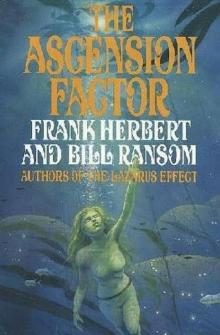 The Ascension Factor
The Ascension Factor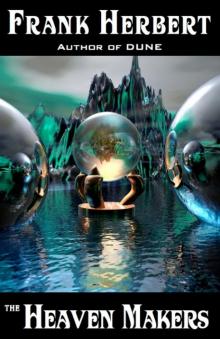 The Heaven Makers
The Heaven Makers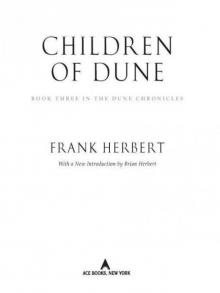 Children of Dune
Children of Dune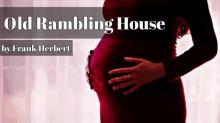 Old Rambling House
Old Rambling House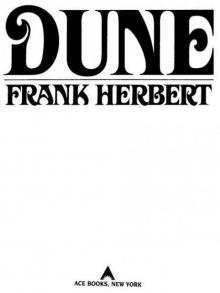 Dune
Dune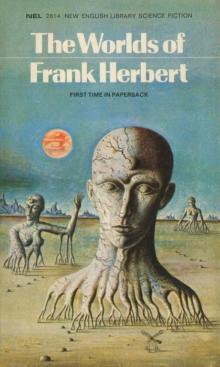 The Worlds of Frank Herbert
The Worlds of Frank Herbert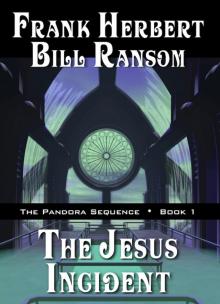 The Jesus Incident
The Jesus Incident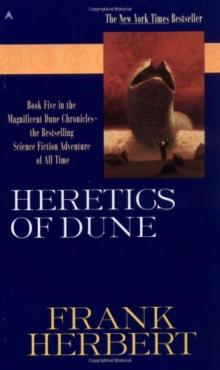 Heretics of Dune
Heretics of Dune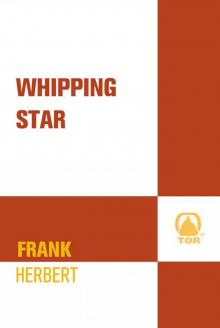 Whipping Star
Whipping Star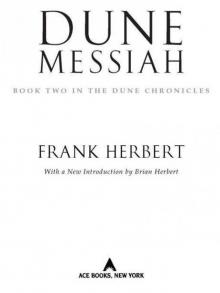 Dune Messiah
Dune Messiah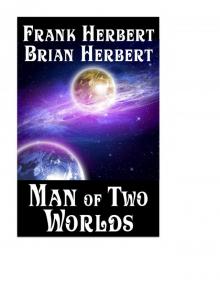 Man of Two Worlds
Man of Two Worlds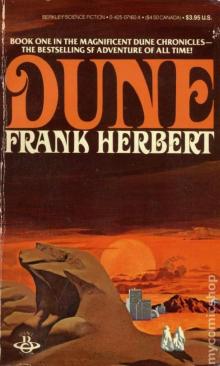 The Book of Frank Herbert
The Book of Frank Herbert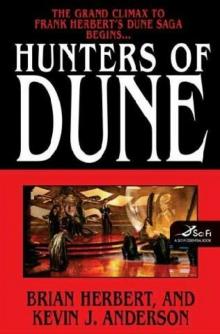 Hunters Of Dune
Hunters Of Dune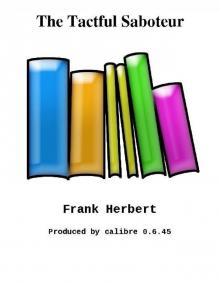 The Tactful Saboteur
The Tactful Saboteur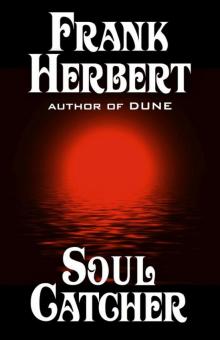 Soul Catcher
Soul Catcher God Emperor of Dune
God Emperor of Dune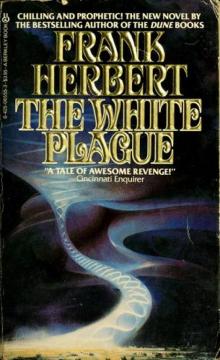 The White Plague
The White Plague The Green Brain
The Green Brain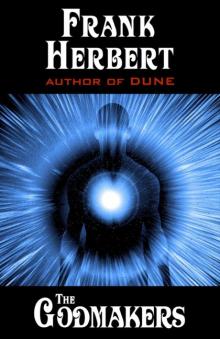 The Godmakers
The Godmakers Sandworms of Dune
Sandworms of Dune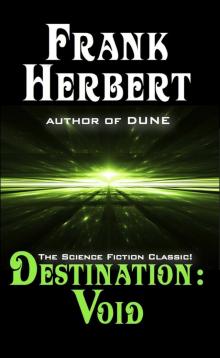 Destination Void
Destination Void The Dosadi Experiment
The Dosadi Experiment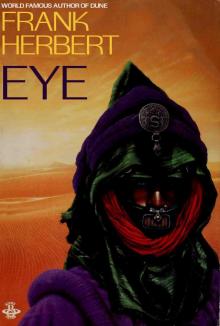 Eye
Eye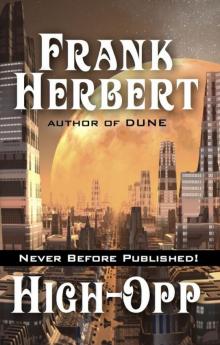 High-Opp
High-Opp The Eyes of Heisenberg
The Eyes of Heisenberg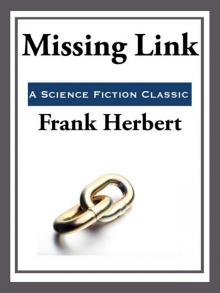 Missing Link
Missing Link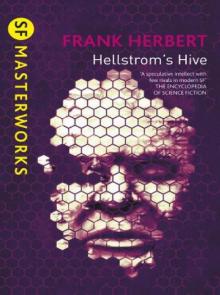 Hellstrom's Hive
Hellstrom's Hive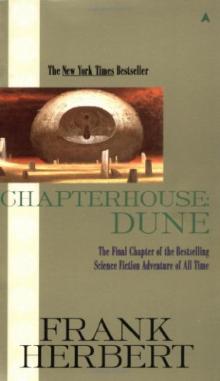 Chapterhouse: Dune
Chapterhouse: Dune The Santaroga Barrier
The Santaroga Barrier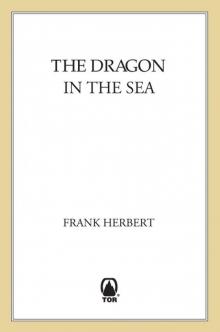 The Dragon in the Sea
The Dragon in the Sea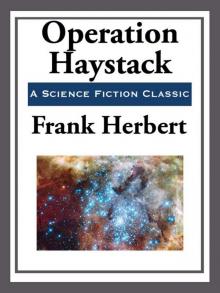 Operation Haystack
Operation Haystack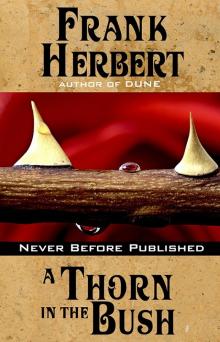 A Thorn in the Bush
A Thorn in the Bush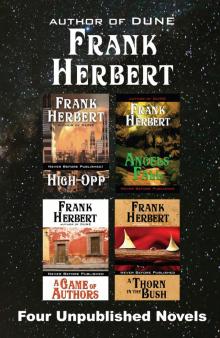 Four Unpublished Novels
Four Unpublished Novels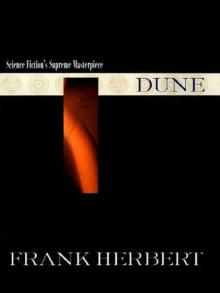 Dune dc-1
Dune dc-1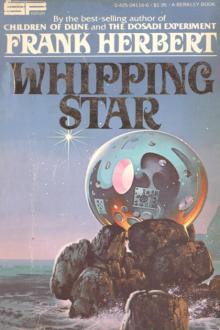 Jorj X. McKie 1 - Whipping Star
Jorj X. McKie 1 - Whipping Star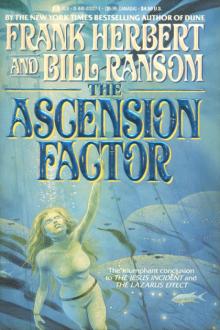 DV 4 - The Ascension Factor
DV 4 - The Ascension Factor Frank Herbert - Dune Book 4 - God Emperor Of Dune
Frank Herbert - Dune Book 4 - God Emperor Of Dune ChapterHouse: Dune dc-6
ChapterHouse: Dune dc-6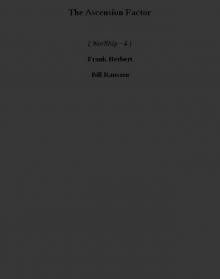 The Ascension Factor w-4
The Ascension Factor w-4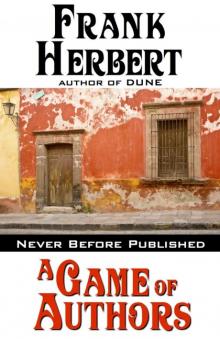 A Game of Authors
A Game of Authors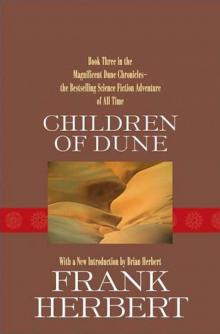 Children of Dune dc-3
Children of Dune dc-3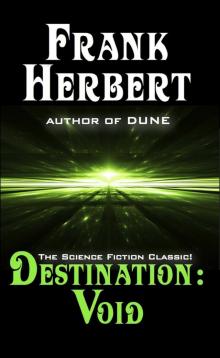 Destination: Void: Prequel to the Pandora Sequence
Destination: Void: Prequel to the Pandora Sequence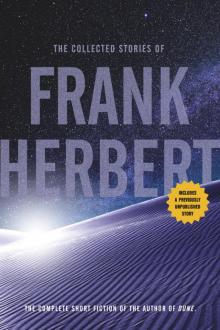 The Collected Stories of Frank Herbert
The Collected Stories of Frank Herbert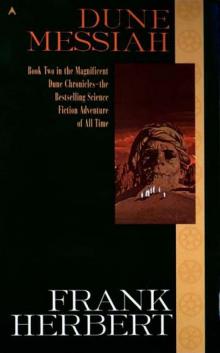 Dune Messiah dc-2
Dune Messiah dc-2 Frank Herbert - Dune Book 5 - Heretics of Dune
Frank Herbert - Dune Book 5 - Heretics of Dune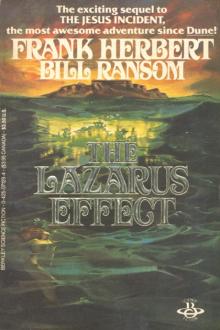 DV 3 - The Lazarus Effect
DV 3 - The Lazarus Effect The Jesus Incident w-2
The Jesus Incident w-2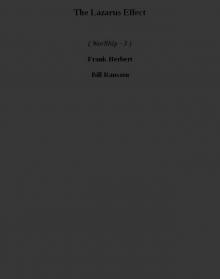 The Lazarus Effect w-3
The Lazarus Effect w-3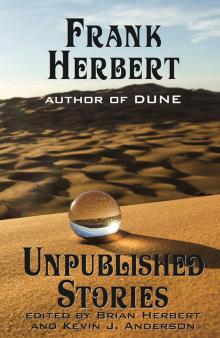 Frank Herbert
Frank Herbert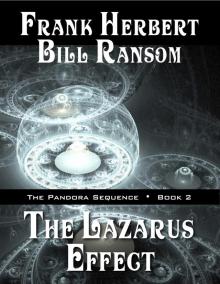 The Ascension Factor: Pandora Sequence
The Ascension Factor: Pandora Sequence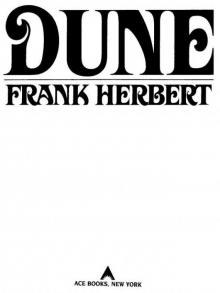 Dune (40th Anniversary Edition)
Dune (40th Anniversary Edition)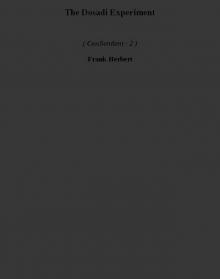 The Dosadi Experiment c-2
The Dosadi Experiment c-2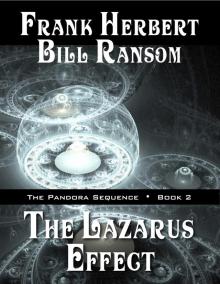 The Lazarus Effect
The Lazarus Effect God Emperor of Dune dc-4
God Emperor of Dune dc-4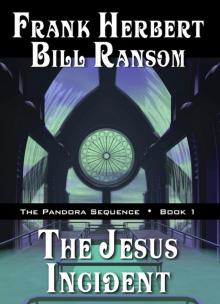 The Pandora Sequence: The Jesus Incident, the Lazarus Effect, the Ascension Factor
The Pandora Sequence: The Jesus Incident, the Lazarus Effect, the Ascension Factor The Green Brain (v4.0)
The Green Brain (v4.0) The Heaven Makers (v4.0)
The Heaven Makers (v4.0)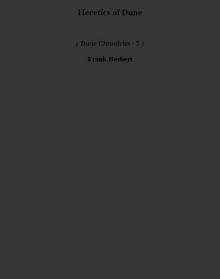 Heretics of Dune dc-5
Heretics of Dune dc-5